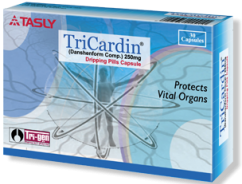TriCardin Vs Standard Anti-Anginal Therapy
TRIAL CONDUCTED BY: Professor Dr. Nazir Ahmed Memon. MBBS, FRCP (London), FACC (USA), FACVS Canada). Professor and Chairman, Department of Cardiology LUMHS. Consultant Cardiologist.
Liaquat University of Medical Health Sciences (Hyderabad, Pakistan)
Dr. Gul Hassan Brohi. Postgraduate MD (Cardiology), Registrar, Department of Cardiology, Liaquat University Hospital, Hyderabad
Dr. Fasih Hashmi. FCPS (Cardiology) Associate Professor Department of Cardiology (CCU), Liaquat University Hospital, Hyderabad, Sindh, Pakistan.
ABSTRACT
TO COMPARE THE RESPONSE AND HOSPITAL STAY OF SUBLINGUAL AND ORAL TRICARDIN IN PATIENTS WITH ACUTE CORONARY SYNDROME ALONG WITH STANDARD ANTIANGINAL THERAPY VS STANDARD ANTIANGINAL THERAPY ONLY.
PATIENTS AND METHODS
- 404 patients diagnosed as ACS on the basis of clinical history, ECG and biomarkers were admitted and included.
- Labeled group A (200 patients Standard antianginal therapy with Tricardin) and group B (204 patients with standard antianginal therapy only).
- Age and risk factors are similar in both groups.
- Age ranges 27 to 80 years
- % of smokers are higher
- Hypertension &
- Diabetes
RESULTS
- The data was obtained from 404 patients selected for study.
- Out of 200 patients of group A, males were 161(80.5%) and females 39(19.5%) while in group B, out of 204 patients males were 165(80.8) and females 39(19.1%).
- In group A 191(95%) patients got relief of chest pain within 15 minutes while in group B no patient got relief of chest pain within 15 minutes but 190(93%) got relief of chest pain within 30 minutes.
- Similarly Hospital stay was short in group A patients ie: 178(89%) discharged on 4th day, while in group B 180(88.2%) discharged on 6th day.
CONCLUSION
- The patients in whom Tricardin was used on top of standard antianginal therapy got relief of chest pain earlier and shorter hospital stay than the patients in whom standard antianginal therapy was used without Tricardin.
- This proves that in patients of ACS in whom Tricardin was used sublingually and orally along with standard therapy got relief of chest pain earlier and were sent home earlier as compared to the patients in whom standard therapy was used without Tricardin.
- These observations may have positive impact on the economy of our poor masses suffering from ACS and on the government budget too.

